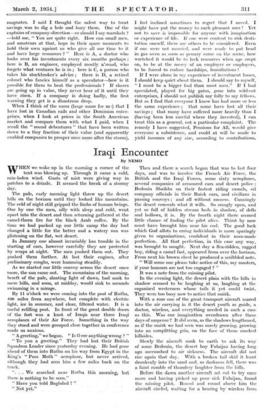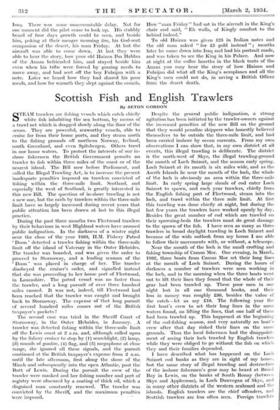Iraqi Encounter
By NEMO
WHEN we woke up in the morning a corner of the tent was blowing up. Through it came a cold, rain-laden wind. Gusts of mist were giving way in patches to a drizzle. It seemed the break of a stormy day.
The pale, early morning light threw up the desert hills on the horizon until they looked like mountains. The cold of night still gripped the limbs of human beings. One by one the men, silly with sleep and cold, went apart into the desert and then returning gathered at the camel-thorn fire for the black Arab coffee. By the time we had packed up our little camp the day had changed a little for the better and a watery sun was glistening on the flat, wet desert.
In January one almost invariably has trouble in the starting of cars, however carefully they are protected by wraps at night. The men pushed them out. They pushed them further. At last their engines, after preliminary coughs, were humming steadily.
As we started our little convoy across the desert once more, the sun came out. The mountains of the morning, bereft of the pale, slanting light of dawn, had sunk to mere hills, and soon, at midday, would sink to mounds swimming in a mirage.
By 11 o'clock we were .coming into the post of Rutba, 400 miles from anywhere, but complete with electric light, ice in summer, and clear, filtered water. It is a useful refilling post. In front of the great double doors of the fort was a knot of Iraqis near three Iraqi aeroplanes of their Air Force. Something in the *ay they stood and were grouped close together in conference made us anxious.
" A greeting?" we began. " Is there anything wrong ? "
" To you a greeting." They had lost their British Squadron Leader since yesterday evening. He had gone ahead of them into Rutba on his way from Egypt in the King's " Puss Moth " aeroplane, but never arrived, although they had seen him a few miles back on the track. , ". We searched near Rutba this morning, but there.is nothing to be seen." " Have you told Baghdad ? ".Not yet." Then and there a search began that was to last four days, and was to involve the French Air Force, the British and the Iraqi Forces, some sixty aeroplanes, several companies of armoured cars and desert police ; Bedouin Shaikhs on their fastest riding camels, oil company officials in their Buick cars, and civilians in passing convoys ; and all without success. Cunningly the desert conceals what it wills. So smugly open, and yet so full of hidden stream beds in 'shadow; of dells and hollows, it is. By the fourth night there seemed little chance of finding the pilot alive. Thirst by now must have brought him near his end. The good luck which God allots to erring individuals is more sparingly given to organizations, confident in their man-made perfection. All that perfection, in this case any way, was brought to nought. Next day a flea-ridden, ragged boy, riding a camel fast, appeared from over the horizon. From next his brown chest he produced a scribbled note.
" Will some one please take notice of this, my masters, if your honours are not too engaged ? "
It was a note from the missing pilot.
In the evening light, the desert plain with the hills in shadow seemed to be laughing at us, laughing at the organized westerners whose tails it yet could twist. They were too busy now to notice that smirk.
With a roar one of the great transport aircraft'soared into the air carrying in it the desert youth as guide, a doctor, wireless, and everything needed in' such a case as this. Was our imagination overdrawn after these days of suspense? It did seem, as the shadows lengthened, as if the smirk we had seen was surely growing, growing into an earsplitting grin, on the face of those cracked hillsides.
Slowly the aircraft sunk to earth to ask its way of some Bedouin, the desert boy Fulaijan having long ago succumbed to air sickness. The aircraft did not rise again that day. With a broken tail skid it leant drunkenly into the sand and, as darkness fell, there was a faint rumble of thundery laughter from the hills.
Before the dawn another aircraft set out to try once more and having picked up poor sick Fulaijan, found the missing pilot. Round and round above him the aircraft Circled, waiting for a bearing by wireless from Iraq. There was some unaccountable delay. Not for one moment did the pilot cease to look up. His stubbly beard of four days growth could be seen, and beside. him, poking at their meagre morning fire, his God-sent companion of the desert, his man Friday. At last the aircraft was able to come down. At last they were able to hear the story, how poor old Haizan Ibn Hablan of the Anaza befriended him,. and stayed beside him even when his tribe were forced by grazing needs to move away, and had sent off the boy Fulaijan with a note. Later we heard how they had shared his poor meals, and how for warmth they slept against the camels. How "man Friday" had sat in the aircraft in the King's chair and said, "'Eh walla, of Kingly comfort to the behind indeed."
To old Haizan was given £25 in Indian notes and the old man asked " for £5 gold instead " ; months later he came down into Iraq and had his portrait made, and was taken to see the King in his Palace. And now at night at the coffee hearths in the black tents of the Anaza you may hear the story of how Haizan and Fulaijan did what all the King's aeroplanes and all the King's men could not do, in saving a British Officer from the desert death.





























































 Previous page
Previous page